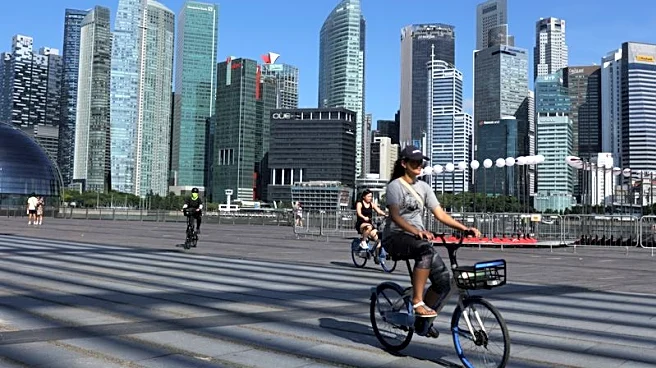SINGAPORE (Reuters) -Singapore on Friday upgraded its economic outlook for 2025 as third-quarter gross domestic product growth beat market expectations and initial estimates.
GDP rose 4.2% in the third quarter from a year earlier, government data showed, faster than the 2.9% official advance estimate released last month and a median forecast of 4.0% in a Reuters poll of economists.
On a quarter-on-quarter seasonally adjusted basis, GDP expanded 2.4% from the second quarter.
The trade ministry raised
its GDP growth forecast for 2025 to "around 4.0%" from a previous range of 1.5% to 2.5%.
It forecast 2026 GDP growth at 1.0% to 3.0%.
"Global economic conditions have turned out to be more resilient than expected," the ministry said in a statement. "In particular, GDP growth in most of Singapore’s key trading partners came in better than expected in the third quarter of 2025."
In response to questions about whether the ministry's 2026 forecast was too conservative, trade ministry permanent secretary Beh Swan Gin said risks remained surrounding trade tensions or a slowdown in spending on artificial intelligence, which has been a key source of export strength.
"Even if AI demand, in terms of the demand for services, remains resilient, the level of capital expenditure may slow if the capital markets soften significantly," he said.
In a separate statement, Enterprise Singapore said it had narrowed its 2025 non-oil domestic exports growth forecast to "around 2.5%", from growth of 1% to 3%, as it expected robust AI-related demand and high gold prices to provide some support to shipments in the fourth quarter.
For 2026, it forecast non-oil exports to grow by 0% to 2%.
At a review in October, the Monetary Authority of Singapore left monetary policy unchanged as growth in the city-state remained resilient despite challenges from U.S. import tariffs.
MAS chief economist Edward Robinson said the central bank's monetary policy stance remained appropriate, with the output gap expected to remain positive in 2025 and to come in at around 0% in 2025.
Singapore's exports to the United States are subject to a 10% tariff. That is lower than the tariffs imposed on its Southeast Asian neighbours, but sectoral levies - including a 100% tariff on branded drugs - remain a significant concern.
Broader sectoral tariffs could hurt demand for Singapore's exports, including semiconductors, consumer electronics and pharmaceutical goods. The central bank has said those three sectors account for about 40% of exports to the United States.
In October, authorities said the implementation of the branded drugs tariff had been delayed to allow companies to negotiate possible exemptions with the U.S. administration.
(Reporting by Jun Yuan Yong; Editing by John Mair and Thomas Derpinghaus)
















